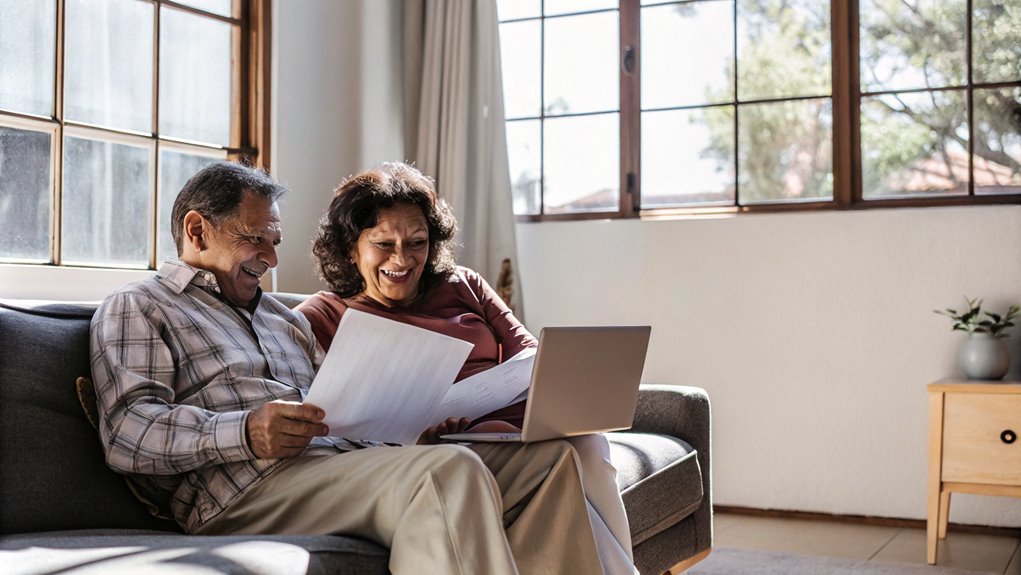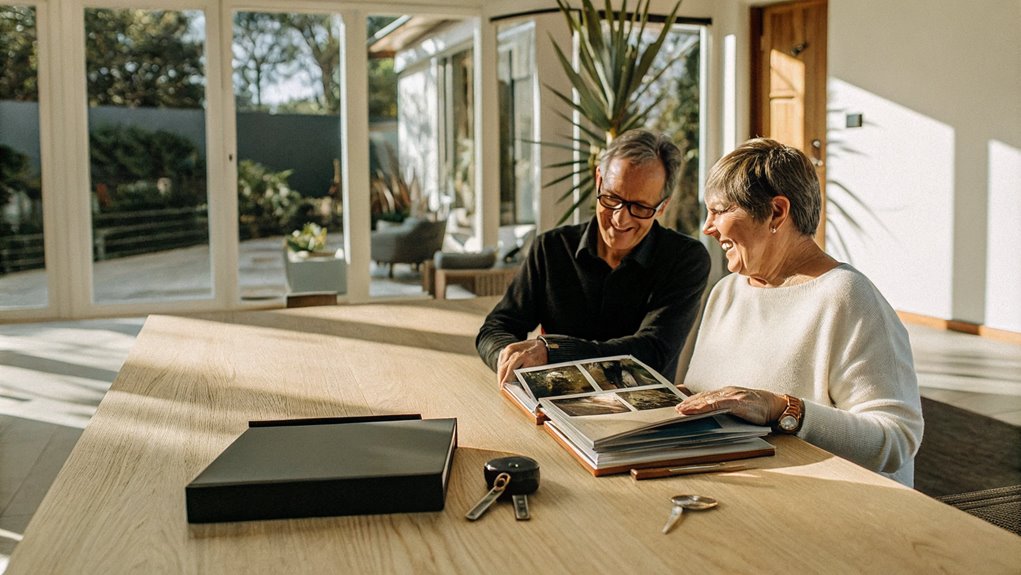A reverse mortgage can help you feel safer about money in retirement. It lets you use money from your home without making monthly payments. You need to be at least 62 years old and own your home. You can get the money all at once, as monthly checks, or use it like a credit card. You won't have to pay back the loan until you move out, sell your home, or die. Your family won't have to pay more than what your home is worth. The government has rules to keep you safe, and you must talk to experts who will help you understand it all. Take time to learn about how it works to see if it's right for you.
Ready to start building equity in your own Michigan home? Get your personalized home loan quote today.
Understanding Reverse Mortgage Basics

Getting money from your home in retirement can help you feel more secure. If you're 62 or older, you can get a special loan called a reverse mortgage. This lets you use the value of your home to get cash, and you can keep living there.
You don't have to pay the loan back each month like a normal home loan. You only need to pay it back when you move away, sell your house, or die.
To get this loan, you must:
- Live in the house most of the time
- Pay your home taxes
- Keep up with house repairs
- Have home insurance
How much money you can get depends on:
- How old you are
- What your house is worth
- Today's loan rates
Over time, you'll owe more money as the loan grows bigger. But you'll never have to pay back more than what your house is worth.
Michigan residents, unlock the door to your new home. Request your home loan quote from Treeside Financial today.
Key Eligibility Requirements
To get a reverse mortgage, you need to meet some simple rules. First, you must be 62 or older. You also need to own your home, or at least most of it. The home must be where you live most of the time.
You need to take good care of your home. You must pay your taxes and home bills on time. Your home can be a house, some types of mobile homes, or a condo that the FHA says is OK. If your home has 2-4 units, you must live in one of them.
Before you can get the loan, you need to talk to a special teacher. They'll help you learn all about reverse mortgages and what they mean for you. This way, you know what to expect when you get one.
Benefits for Retirement Planning

Your home can help you in retirement. Think of it like a special bank account. With a reverse mortgage, you won't need to make house payments anymore. You still own your home, but now you have extra money for food, bills, or doctor visits.
This can help when the stock market goes down. You won't need to use up all your savings. You can get the money in different ways: all at once, monthly like a paycheck, or keep it ready when you need it. You pick what works best for you.
Your family can still get your house when you're gone. They'll need to pay back what you borrowed. Don't worry – you or your family will never have to pay back more than what your house is worth. The government makes sure of this.
Accessing Your Home Equity
Your home has money locked inside it that you can use through a special loan called a reverse mortgage.
First, an expert will look at your home to tell you how much it's worth. How much you can get depends on your age, today's loan rates, and what your home is worth.
You can get your money in different ways. You can get it all at once, get some each month, or have it ready when you need it – like a credit card.
The best part is that any money you don't use grows bigger over time. You still own your home, and you don't have to pay the loan back monthly. You just need to take good care of your home and pay your taxes and home insurance on time.
The loan only needs to be paid back when you leave your home for good, sell it, or pass away.
Payment Options and Flexibility

Getting money from a reverse mortgage is easy and works differently than regular loans.
You can choose how to get your money:
You can get all the money at once.
You can get money every month.
You can get money when you need it.
You can mix these ways together.
If you pick getting money when you need it, any money you don't use grows over time. This helps you save more for later.
Monthly payments work in two ways:
- You can get money for a set time
- You can get money as long as you live in your home
The best part is you can change how you get your money at any time. This helps you match the payments to what you need as time goes by.
Staying in Your Home
You can keep living in the home you love with a reverse mortgage.
You get to stay where all your memories are. No one can make you move out as long as you pay your taxes and take good care of your house.
You can still see your friends next door and spend time with family who live close by.
Your home stays your home, just like it always has been.
Maintain Familiar Surroundings
Your home is where your heart is. A reverse mortgage lets you stay in the place you love. You can keep your friends next door and go to the stores you know well.
Your house holds all your happy times. Each room reminds you of good days with family and fun parties.
With a reverse mortgage, you can get money from your house but still live there. You won't have to move away or find new doctors. You can stay close to your drug store and your coffee shop.
Best of all, you keep the friends you've known for years.
No Forced Relocation Worries
You can stay in your home with a reverse mortgage. Many older folks worry about having to move. But with this loan, you can stay put.
You own your home and can use the money in it. You just need to do three simple things:
- Pay your taxes
- Keep home insurance
- Take care of your house
You don't have to make monthly payments like other home loans. The house stays yours. No one can make you leave, even if money gets tight or house prices change.
You can enjoy your home and plan for your future without worry.
Keep Your Community Connections
Your Friends and Neighbors Matter
Living in the same home helps you stay close to people who care about you. You know the folks at the stores, your doctors, and your neighbors. These friends make your life better.
With a reverse mortgage, you can stay in your home and keep doing what you love. You can still go to your church, join local events, and see friends. Your kids and grandkids can visit the house they know well.
Having friends nearby makes you feel happy and safe. You know where to find help when you need it.
Plus, you can trust the people who help you because you've known them for years.
Financial Safeguards and Protections

We made rules to keep your money safe with reverse mortgages.
Before you get one, you must talk to a helper who explains everything. The FHA makes sure banks follow the rules when they give you money from your home.
They set limits on how much you can borrow.
Best of all, you or your family will never have to pay back more than what your home is worth. This is true even if you end up owing more than your home's value.
Government Oversight And Regulation
The government helps keep you safe when you get a reverse mortgage. They've clear rules that everyone must follow.
Before you can get a reverse mortgage, you need to:
- Talk to a special teacher about how these loans work
- Show papers about your money to the bank
- Get a clear list of what the loan will cost
You will never have to pay back more than what your home is worth. This is because the loan comes with special insurance.
The government also watches banks closely to make sure they treat you fairly.
Built-In Borrower Protections
Your reverse mortgage keeps you safe with rules that help protect your money. You never have to pay back more than what your home is worth. This means if you owe more than your home's value, you won't have to worry about the extra cost.
Before you get a reverse mortgage, you must talk to a teacher who'll help you learn about it. They make sure you know what you're getting into.
If you pass away, your husband or wife can stay in the home even if their name isn't on the loan.
The home stays yours the whole time. No one can make you move out if you pay your taxes, keep your home in good shape, and have home insurance.
Impact on Social Security
Getting a reverse mortgage won't change your regular Social Security checks. These checks come from your past work and what you earned over the years.
But if you get SSI (extra help from Social Security), you need to be careful with your reverse mortgage money.
Here's what to do to keep your SSI:
- Only take small amounts each month
- Use all the money in the same month you get it
- Think about getting your money only when you need it, not as monthly payments
Many older people use both Social Security and reverse mortgages to help pay their bills.
If you plan well, you can use both to have enough money in your later years.
Inheritance Considerations

Think about your family when you get a reverse mortgage. Over time, you'll use up more of your home's value. This means less money for your loved ones later.
When you pass away, your family has three choices:
- Pay off the loan and keep your home
- Sell the home to pay back the loan
- Let the bank sell the home
If you want to leave more to your family, you can:
- Take out a smaller loan
- Look for other ways to get money
The good news is your family won't have to pay more than what your home is worth. Even if you end up owing more than the home's value, they won't have to cover the extra cost.
Talk to your family about these choices. When everyone knows the plan, they can better support your choice.
Costs and Fees
Taking out a reverse mortgage costs money. You need to know about these costs before you decide to get one.
You will need to pay:
Money at the start:
- A fee that protects your loan (2% of what your home is worth)
- A fee to start the loan ($2,500 to $6,000)
- Fees for people who check your home and papers
Money every year:
- A smaller protection fee (0.5% of your loan)
- Your house taxes
- Home insurance
- Home fixes and care
These costs are important. Think about them when you decide if a reverse mortgage is right for you and your money.
Making an Informed Decision

Let's make smart choices about reverse mortgages. They can be tricky, so take your time to think about what matters to you:
Money Plans
- Think about how much money you need for the years ahead.
- Write down what you spend each month.
Your Home
- Find out what your home is worth now.
- Ask a home expert to check its value.
Your Family
- Talk to your kids about your plans.
- Ask how they feel about it.
Other Ways to Get Money
- Look at different ways to get the cash you need.
- See which way costs less.
Your Future
- Think about how long you want to stay in your home.
- Check if your home still fits your needs.
Get help from a free advisor who knows all about reverse mortgages. They'll help you make the best choice for you and your family.
They want to make sure you understand everything before you decide.







